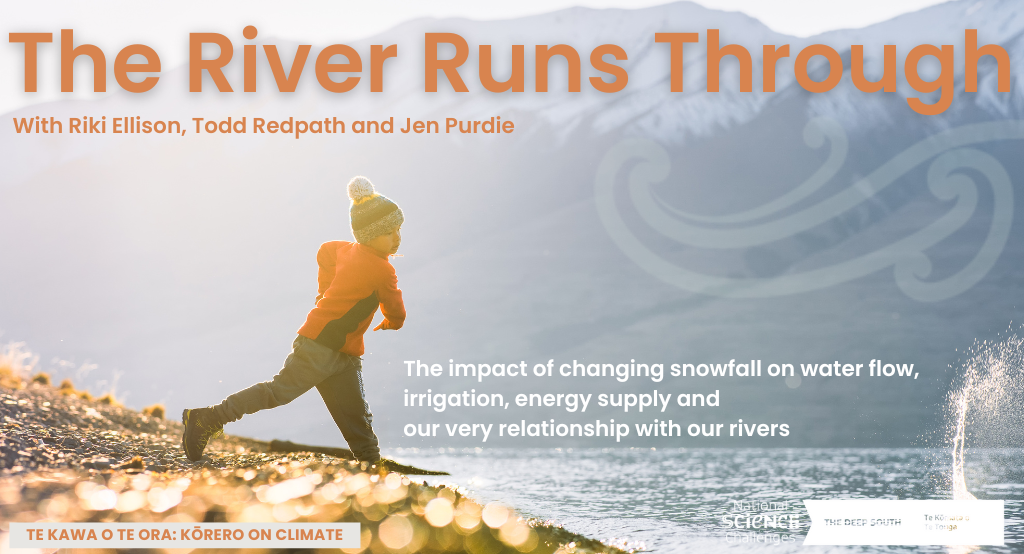Wednesday, April 26, 2023
12-1pm
Location
Virtual hui: To participate via Zoom, please register in advance
Webinar: The River Runs Through
The impact of changing snowfall on water flow, irrigation, energy supply and our very relationship with our rivers

Here in Aotearoa, we’ve tended to treat water as a resource that will never run dry.
We’ve built an energy network dependent on consistent lake levels and we’ve turned drylands into arable landscapes using irrigation. Snow fall in our mountain regions feeds our largest hydro-electric power schemes, and provides critical water – especially during drought. We’ve followed the principal that almost all water is available to use, and haven’t thought enough about how much water the river itself requires, or the lifeforms it sustains. Water has looked after us, but have we looked after it? Do we know enough about where this water comes from and how its changing with our climate?
With climate change seriously impacting how much it snows and rains, and how long snow remains in the mountains, we need to think more carefully about the way we relate to our rivers – from their source in the mountains all the way to the coast, and beyond.
There is much to learn from mātauranga Māori, and in this webinar, Riki Ellison (Ngāi Tahu), will speak to the work he has done over years towards establishing Te Mana o Te Wai, a concept highlighting how by protecting freshwater, we protect our future. Riki will be joined by Todd Redpath and Jen Purdie, two Deep South Challenge researchers, to discuss how we relate to water now and in years to come.
We’ll also hear directly from Jen and Todd. Todd Redpath’s research examines an often overlooked component of the water cycle: the large amount of water that is actually stored as snow or ice in our mountains. Snow makes a crucial contribution to many of our largest catchments, but until recently it has been poorly understood and poorly modelled, making the management of precious water a difficult task.
Looking towards the future, Jen Purdie’s research looks at how climate change, including water and snow melt as well as irrigation pumping load under drought, may impact electricity demand and supply. This is particularly relevant to the proposed pumped hydro scheme at Lake Onslow.
Our ability to both reduce our carbon emissions and adapt to the climate change already locked in depends in large part on the health and future of our rivers. We invite you to join us in this important conversation that truly flows from the source to the tap.
ABOUT OUR PRESENTERS
Riki Ellison
Riki is a consultant specialising in environmental management and iwi Māori development, working with central government agencies, local government, iwi and hapū. As an adviser to the Freshwater Iwi Leaders Group and a member of the Ministerial advisory group Kāhui Wai Māori, he has an in-depth knowledge of Te Mana o te Wai in a policy context.
Todd Redpath
Todd works as a Lecturer in the Schools of Geography and Surveying at Otago. His research is focused on seasonal snow in the Southern Alps/Kā Tiritiri o te Moana, primarily within a Deep South Challenge funded project that aims to improve the representation of seasonal snow within the New Zealand Water Model. He is a founding member of the Mountain Research Centre at the University of Otago, and a board member for Protect Our Winters Aotearoa. Hailing from Invercargill, Todd was fortunate to grow up snowboarding on the mountains of the Southern Lakes.
Jennifer Purdie
Jennifer Purdie has spent most of her career in the electricity sector. She worked as a water, wind and energy modeller, and then a climate change modeller at Meridian Energy for 14 years before moving into the research space. Her current research includes modelling the impact of climate change on our electricity sector up to 2050.